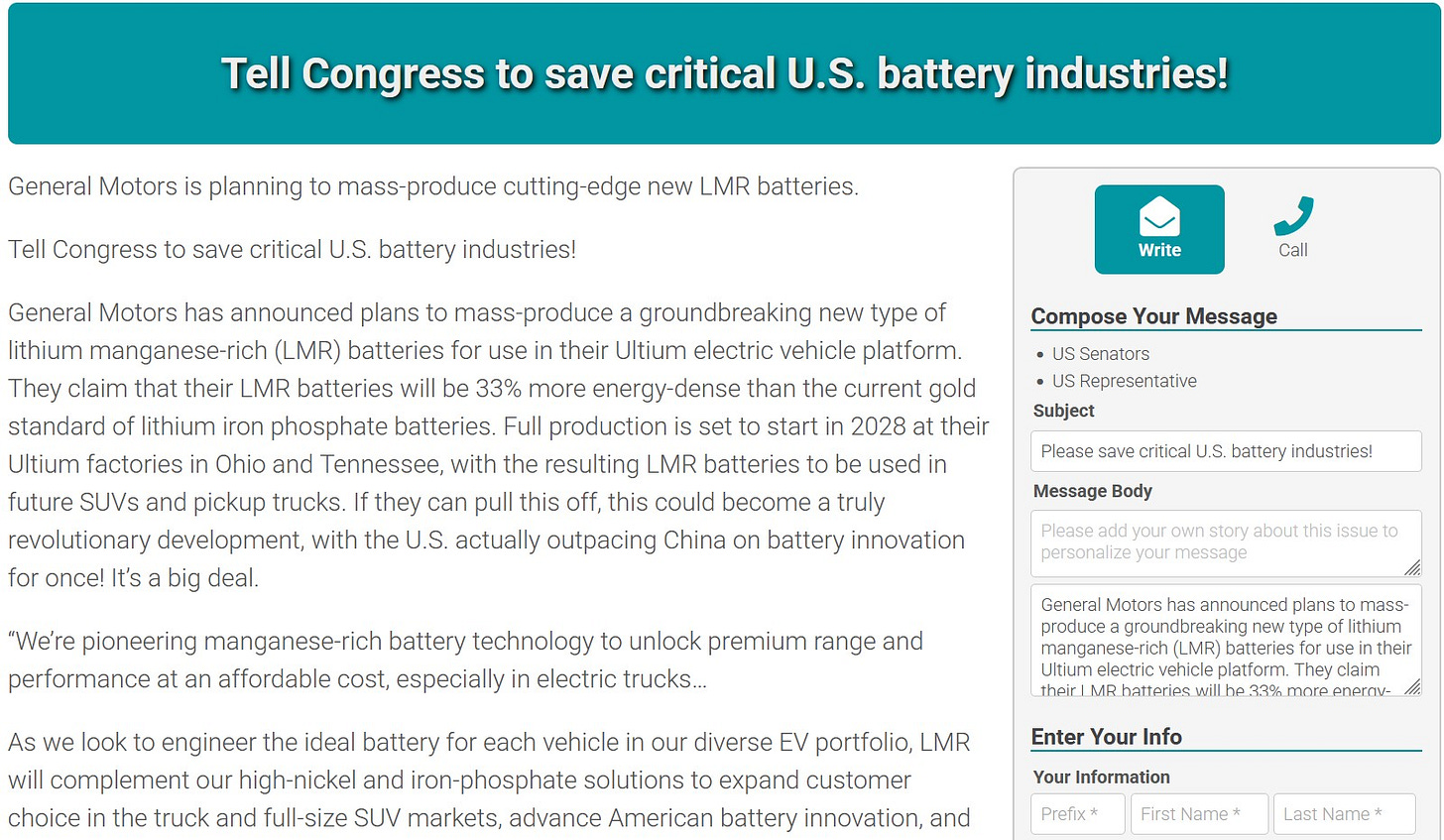General Motors is planning to mass-produce cutting-edge new LMR batteries.
Tell Congress to save critical U.S. battery industries!
Touch or scan the QR code below to take today’s action in the app and earn trees!
Or take action on the Internet – no app required!
Reasons For Hope
General Motors has announced plans to mass-produce a groundbreaking new type of lithium manganese-rich (LMR) batteries for use in their Ultium electric vehicle platform. They claim that their LMR batteries will be 33% more energy-dense than the current gold standard of lithium iron phosphate batteries. Full production is set to start in 2028 at their Ultium factories in Ohio and Tennessee, with the resulting LMR batteries to be used in future SUVs and pickup trucks. If they can pull this off, this could become a truly revolutionary development, with the U.S. actually outpacing China on battery innovation for once! It’s a big deal.
“We’re pioneering manganese-rich battery technology to unlock premium range and performance at an affordable cost, especially in electric trucks…
As we look to engineer the ideal battery for each vehicle in our diverse EV portfolio, LMR will complement our high-nickel and iron-phosphate solutions to expand customer choice in the truck and full-size SUV markets, advance American battery innovation, and create jobs well into the future.”
—Kurt Kelty, General Motors.
Batteries are getting more important to human civilization by the day. They power the electric cars increasingly dominating the world’s roads, distribute the clean electrons increasingly powering the world’s grids, and animate the drones increasingly fighting the world’s wars.
America has no shortage of hardworking innovators striving to build the critical new battery technologies that are increasingly critical to geopolitical competitiveness and economic prosperity. But the federal government is on the verge of devastating these bold new U.S. battery industries in an act of nonsensical ideology-driven self-sabotage.
“Whichever country dominates electrical technology will therefore rule the land and the sky in the 21st century. AI is amazing, and yet without drones for it to command, it will not be able to win modern wars. And no matter how entertaining our online lives are, humans will still need to move themselves and their possessions around in physical space, so the auto industry will continue to be incredibly lucrative and important.
Currently, America is losing this race, in dramatic and catastrophic fashion…
China is absolutely trouncing us in the race for the new electrical technologies that will define physical power this century.
Given this dire situation, you’d think America would be racing to catch up. Instead, we’re intentionally forfeiting the race, destroying our nascent electrical capabilities as fast as we can”
—Noah Smith, leading economics commentator.
The House Republican federal budget proposal means that Congress might cut or repeal vast swathes of the domestic industry-building Inflation Reduction Act tax credits, including the 45X advanced manufacturing credit that provides critical support for American battery-making and the range of tax credits that incentivize U.S. electric vehicle manufacturing and sales. This bill, as it stands, is absolutely terrible for America’s industry, economy, and security. A recent report from the Energy Innovation think tank has calculated that this proposed reconciliation bill’s attacks on clean energy would decrease U.S. GDP by $1.1 trillion through 2034!
For the sake of economic prosperity and national security, Congress needs to reject all cuts to vital Inflation Reduction Act tax credits, reverse executive branch attacks on clean energy technologies, and decisively act to support and sustain America’s battery industries!







I found the reference to drone weaponry odd (in the sense of, doesn’t resonate with my values). Is that meant to be an appeal to war hawk/nationalist (i.e. anti-global supply chain) lawmakers?
Please visit EARTHABOVEALL.NET
COP-CHICO-MENDEZ instead of COP30
(Brasil, Nov 25)